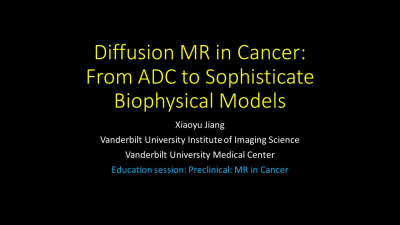Weekday Course
Preclinical: MR in Cancer
Joint Annual Meeting ISMRM-ESMRMB & ISMRT 31st Annual Meeting • 07-12 May 2022 • London, UK

| Preclinical Cancer I | |||
| 09:15 | Biological & Physiological Considerations in Preclinical Cancer Imaging
Renuka Sriram
The goal of this educational session is to provide an overview of the use of murine cancer models, the associated imaging protocols and its impact on biological and physiological processes. This will help the audience better understand the potentials and the shortcomings of the choices pertaining to in vivo tumor models for imaging studies of cancer development, progression and therapy.
|
||
| 09:45 |  |
Diffusion MR in Cancer: From ADC to Sophisticated Biophysical Models
Xiaoyu Jiang
The cancer applications of DWI-derived ADC values are limited because ADC values are non-specific and have complicated relationships with pathological changes in biological tissues. Therefore, sophisticated biophysical tissue models have been developed for extracting the most salient underlying cellular properties which can be associated with specific pathological changes. This education talk first covers the basics of how to derive cellular properties from diffusion signals using pragmatic biophysical models, then provides example applications of how the DWI-derived cellular properties (notably, cell size) can improve the cancer treatment response assessment, and last discusses some technical considerations related to practical and clinical feasibility.
|
|
| Preclinical Cancer II | |||
| 10:15 | Contrast-Enhanced MRI in Cancer: Is It a Biomarker or a Fad?
Rong Zhou
The lecture will provide a succinct overview of quantitative imaging biomarkers (QIB) derived from contrast-enhanced MRI, specifically DSC- and DCE-MRI and their applications in cancer. The technical and physiological aspects which impact the repeatability of these biomarkers as well as community efforts to reduce variations and enhance standardization via multicenter studies will be discussed. The goal of the lecture is to better inform and prepare the attendees through a broad yet detailed and unbiased review.
|
||
| 10:45 | Role of X-Nuclei in Understanding Cancer Metabolism & Physiology
Pavithra Viswanath
Advances in genomics have identified an array of clinically relevant mutations that drive tumor initiation and maintenance. There is an urgent need to utilize this genomic information to improve patient outcomes. Many oncogenes induce metabolic reprogramming, which is a hallmark of cancer, and this relationship provides the unparalleled opportunity to identify metabolic imaging biomarkers that enhance diagnosis and treatment response assessment for cancer patients. In this talk, I will discuss the use of X-nuclei imaging (hyperpolarized 13C-, 31P- and 2H-magnetic resonance spectroscopy) for monitoring oncogenic events in cancer and examine the ways in which these modalities can guide patient management.
|
||
The International Society for Magnetic Resonance in Medicine is accredited by the Accreditation Council for Continuing Medical Education to provide continuing medical education for physicians.